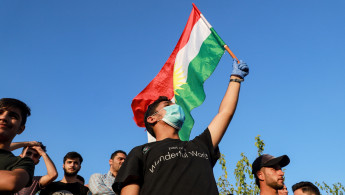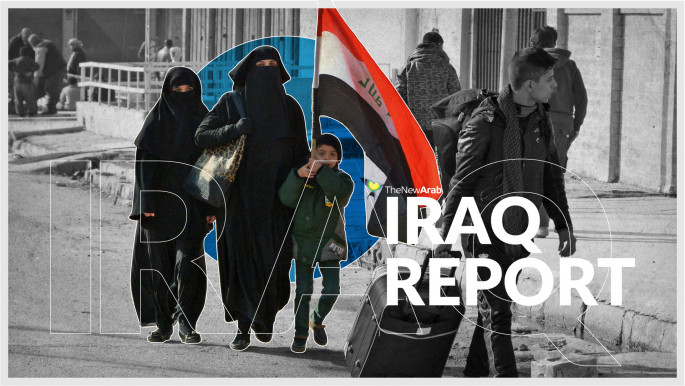The Iraq Report: Human rights violations as protests rage in Iraqi Kurdistan
Not only did the KRG use deadly force against unarmed protesters, but they had throttled the internet connection to prevent citizen journalists from exposing these violations on social media and ordered local media to stop reporting on the protests.
Iraqi Kurdistan's woes are intricately linked to the wider problems Iraq faces as a whole, with protests in the Shia-dominated south against much the same issues having been a mainstay of the Iraqi political scene since October last year.
Those demonstrations were also met with deadly state violence and with the economy spiralling, and the increasing lack of confidence in Iraq's political leadership to solve the people's problems, this phenomenon is only likely to increase.
KRG slammed for human rights abuses
International rights monitors have sharply criticised the KRG for human rights abuses perpetrated against Iraqi Kurds demonstrating across the autonomous Kurdistan region since early December, protesting rampant corruption, unpaid salaries, and a lack of basic services.
 |
The demonstrations in Baghdad and southern Iraq were a catalyst for the eruption of demonstrations in Kurdistan. The reasons are almost the same |  |
About a dozen protesters have been killed by Asayish and other Kurdish security forces since protests started in Suleimaniyah, Kurdistan's second city, on 3 December before spreading across the northern region. Among those killed was a 13-year-old child in the town of Sayid Sadiq.
Angry crowds set fire to local government buildings and political parties' headquarters including offices of the KDP and the PUK, which they accuse of corruption. While the KRG has appealed for calm and time to resolve issues of unpaid salaries, it also blamed "agitators" for attempting to hijack the protest movement to cause political instability. Rights defenders have been increasingly concerned about security forces targeting press organisations in the region, specifically local television station NRT.
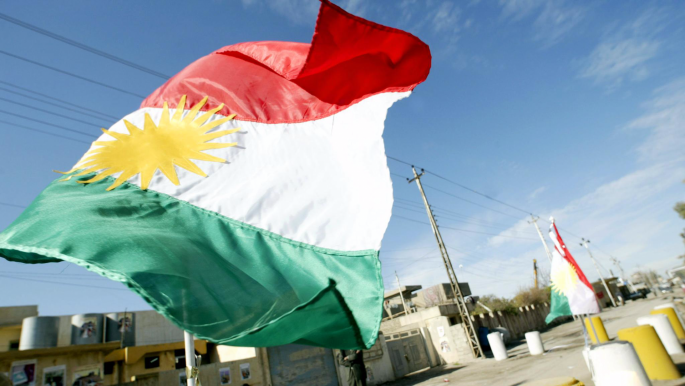 |
|
| Read more: In Iraqi Kurdistan, plunging oil prices raise fears of economic collapse |
In a dawn raid as protests escalated, local security forces stormed NRT's Suleimaniyah bureau and halted its live broadcast, the channel's newsroom chief Rebwar Abdulrahman told AFP.
He said some of the channel's equipment had been confiscated and other equipment had been broken during the raid. "Stopping a channel's broadcast is a blatant violation of the region's press law," Abdulrahman said.
Like the rest of Iraq, media outlets in the Kurdish region are nearly all linked to political figures or parties. NRT is owned by a member of the New Generation Movement, a Kurdish opposition party.
Press freedoms in Kurdish Iraq have been enshrined by a regional law for over a decade. The Committee to Protect Journalists (CPJ) said it was "very concerned" by the recent shutdown, which comes after NRT's offices in the regional capital Erbil and northwest city of Duhok faced similar closures this year.
"It's a pattern for authorities in Iraqi Kurdistan, be it in Sulaimaniyah or Erbil or Duhok, and an attempt to silence NRT for its coverage of protests that have been ongoing over unpaid salaries for public servants and lack of public services," said CPJ's Ignacio Miguel Delgado.
Reports also emerged of government ordered restrictions on social media sites and internet throttling to prevent citizen journalists from uploading videos and images of instances of alleged police brutality, causing rights watchdog Amnesty International to rebuke the KRG.
 |
Many of those protesting come from the youth who barely remember the reign of former Iraqi dictator Saddam Hussein, if they remember him at all |  |
Meanwhile, the Euro-Mediterranean Human Rights Monitor has condemned Kurdish authorities for failing to protect protesters after they were gunned down by guards working for leading opposition parties, including the Patriotic Union of Kurdistan (PUK) and the Gorran Movement.
The ruling Kurdistan Democratic Party (KDP) has also been criticised for using live fire against demonstrators outside their party headquarters in Chamchamal.
Commenting on the demonstrations, Kurdish activist Saman Amin told The New Arab: "The demonstrations in Baghdad and southern Iraq were a catalyst for the eruption of demonstrations in Kurdistan. The reasons are almost the same."
This is not the first time in recent years that the KRG has used violence to quell protesters. In 2018, anti-austerity protests, again against unpaid salaries, rocked the streets of major cities such as Dohuk and the Kurdish capital Erbil. Kurdish authorities responded by deploying security forces and armed plain-clothed officers to infiltrate the protesters and violently disperse them.
At the time, Amnesty released a statement saying: "The Kurdish authorities must immediately put an end to the beating, harassment and intimidation of demonstrators and journalists. They have a duty to ensure that everyone can exercise their right to peaceful protest without interference."
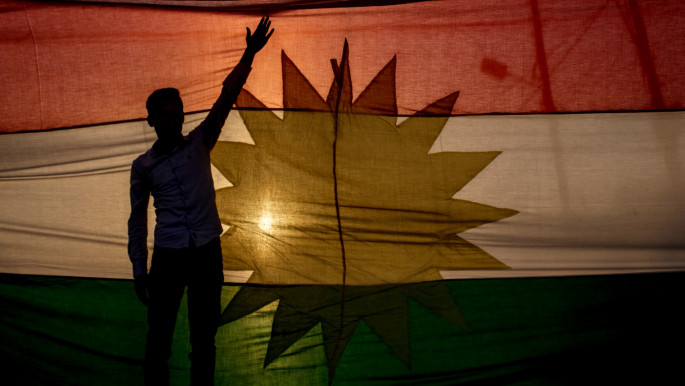 |
|
| Read more: Unpaid salaries and corruption fuel public anger in Iraqi Kurdistan |
However, KRG Prime Minister Masrour Barzani faces a difficult task in appeasing his people. The KRG's coffers have been emptied by years of mismanagement and credit-heavy investment in real estate, a bubble that has now well and truly burst, requiring extensive loans from the federal government in Baghdad and neighbouring powers such as Turkey.
Adding to Kurdish woes was the financial strain of fighting the war against the Islamic State (IS) group, including the cost of hosting millions of refugees fleeing IS, and then former President Massoud Barzani's failed independence bid in 2017 that led to his political demise.
These circumstances have only fuelled perceptions that there is a two-tier economy in Kurdistan. The political elite, whether ruling or opposition parties, all enjoy significant wealth and economic advantages while the squeezed middle class of teachers, civil servants, and health workers face salary cuts or go without any pay at all.
Many of those protesting come from the youth who barely remember the reign of former Iraqi dictator Saddam Hussein, if they remember him at all. They are therefore unaffected by invocations from senior Kurdish politicians of the "resistance" as they see their region being mismanaged by Kurds, not Arab dictators.
Due to the involvement of even opposition parties in their woes, as they are all part of a wealthy elite, Kurds are beginning to lose faith in the power of the ballot box. Much like the rest of Iraq, that can only spell trouble for the region's future as people seek to assert their will by other means.
 |
The KRG's coffers have been emptied by years of mismanagement and the financial strain of fighting the war against the Islamic State |  |
Leaked policy paper fuels economic concerns
A leaked draft of Iraq's state budget sent Iraqis into a panic on Thursday as it confirmed the government's intentions to devalue the national currency, the Iraqi dinar, and cut salaries to cope with the impact of a severe economic crisis.
Discussions about devaluating the Iraqi dinar, which has been pegged to the dollar for decades, have been going on for weeks as the government worked to finalised the 2021 budget.
The draft law, which has to go through a parliament vote first, gives an anticipated exchange rate of 1,450 Iraqi dinars for the dollar - a significant drop from the central bank's current official rate of around 1,182 dinars for $1.
As the draft made rounds on social media, the Finance Ministry expressed "resentment and deep regret over the unauthorized publication" of the proposed law, saying public hysteria would impact the neutrality of ministers.
The news prompted an outcry from government workers fearing serious cutbacks with the devaluation compounded with benefit reductions.
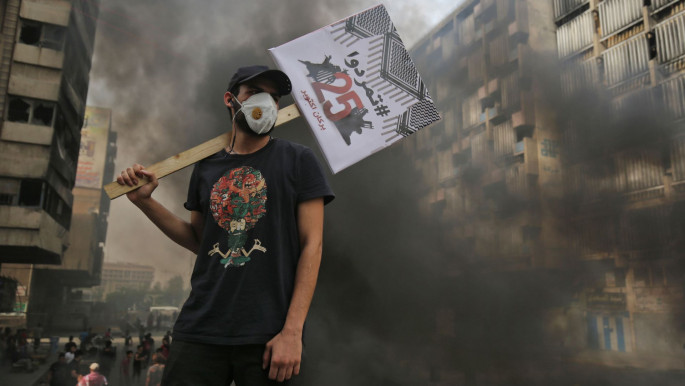 |
|
| Read more: 'They are still trying to silence us': One year on, Iraq's youth rise again |
"The majority of Iraq's work force are government employees. We are the middle class, but (the government's latest) decisions are going to make us the poorest class," said Ali Kadhim, 50, a teacher.
"I am paying off two loans that take up a third of my salary. After these decisions I don't know how much I am going to earn," he added.
Several public workers echoed his fears, including physicians, dentists, school teachers and administrators in various ministries.Reformists in the government consider public wages unsustainable.
Currently, Iraq's public sector wage bill stands at an eye-watering $5 billion per month. However, and despite oil exports making up 90 percent of the country's GDP, oil income only accounts for approximately $3.5 billion of that figure, placing the treasury under significant pressure.
While it is true the Iraqi government has one of the world's worst corruption rates which has fuelled the public's anger against the proposed reforms to halve the wage bill, Iraq's bloated public sector has been an issue since the rule of the Baathists that ended in 2003.
When oil prices and exports are high, Iraq enjoys an artificial sense of economic security as it can afford to subsidise the population by drafting the workforce into hundreds of thousands of jobs, many of which serve no real purpose apart from reducing unemployment. However, any economic downturn swiftly exposes the weakness of Iraqi economic fundamentals.
Oil cartel OPEC has slashed export quotas and compelled its members, including Iraq, to comply to support dwindling oil prices since the coronavirus pandemic wreaked havoc with world markets in 2020.
Iraq's deputy prime minister and finance minister, Ali Allawi, told a virtual Chatham House event in London late last month that his country's patience with the OPEC quotas was wearing thin, and criticised the "[oil] policy of one size fits all."
However, even if Iraq ramped up production once more, it cannot produce enough oil to counterbalance its expenditure and is therefore heavily reliant on the goodwill of international actors and donors for support.
Without a rebalancing of the national economy to encourage enterprise, trade, and foreign investment, as well as tackling rampant corruption and graft, Iraq's financial and economic woes are likely to persist long into the future.
